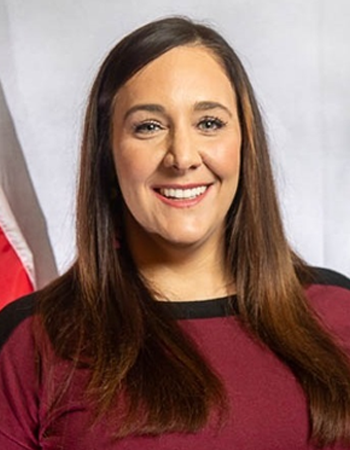Monteigne Long: "We now value the strengths veterans bring to our campuses."
Monteigne Long is the Assistant Director of the Office of Veteran Services with the Texas A&M University System.

Monteigne Long has been working with student veterans and military-connected students in higher education since 2010, when colleges and universities saw a large influx of Post 9/11 veterans. Prior to joining The Texas A&M University System, she served as the Veterans Coordinator at Antelope Valley College in Lancaster, CA, and opened the first Veterans Resource Center at California State University, Northridge.
Monteigne Long got her start in higher education at the University of Southern California while pursuing a masters degree in Postsecondary Education and Student Affairs. She is currently a doctoral student in Higher Education Administration at Texas A&M University and her research will focus on student veteran success.
I always envisioned becoming an academic advisor or working in student affairs, but during my first semester of graduate school, I read an article about serving a somewhat “new” student population, student veterans. My first husband was killed in action in Afghanistan, and I immediately knew that I could make an impact working with military-connected students. Literally, since that day, I have worked to improve the experiences of student veterans and their families as they transition from military life to civilian and student life.
I’ve worked with student veterans at two-year and four-year institutions, so I’ve witnessed a wide range of challenges. At the community college, I had student veterans who were within weeks of separating from the military so they were still navigating the transition to civilian life. At the four year institution, I work with primarily transfer students, so there is a challenge coming to a large campus with different academic expectations.
I use my experiences as a Military Spouse to build rapport with my students. I share my story with them up front so they know and understand my personal connection to the military.
While not a student veteran, I do utilize VA education benefits, so I am able to share my knowledge and experience using benefits and navigating the VA benefits process with my students .
I think veteran support in higher education has come a long way in the past twelve years that I have worked with the military-connected population. For a long time, we approached student veterans from a deficit lens, but I think that has gradually shifted over time and we now value the strengths veterans bring to our campuses. That’s not to say that student veterans do not experience challenges or barriers to higher education. I think some of the biggest and most common challenges are the transition to higher education; finding other student veterans on campus for camaraderie and support or networking; balancing competing demands, such as work and family obligations; and being engaged on campus.
In my current role, I do not have as much interaction with student veterans as I did in the past (problems of moving up in administration), however, I do manage a support program and assist with the First Generation Veteran Learning Community, which keeps me connected with student veterans. I’ve heard recently from my students the importance of a support network and being connected on campus to other students, faculty, and staff.
Building a network early on can lead to internship and job prospects, as well as opportunities for engagement on campus. The old adage, “It’s who you know, not what you know” can be very true, and my students are realizing the value of building a network early in their college career.
In the next five to ten years, I hope higher education values student veterans and the strengths they bring to the institution even more. Student veterans have so much to contribute to the campus in terms of lived experiences and leadership and those skills bring great value in and out of the classroom. I think we will see more student veterans returning for graduate-level degrees, a trend we are already starting to see, with the changes in policies that have extended VA education benefits.
One thing I like to ask my students early on is “what is your why?” I think if you know your “why” you are able to align your strengths, talents, and values with your career and educational goals. Keeping that “why” at the forefront will center all that you do.
